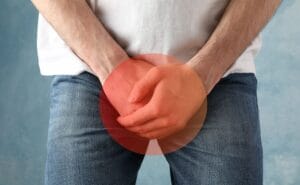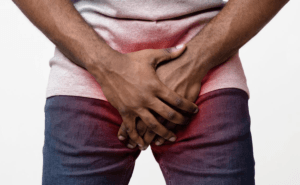If you’ve ever felt a sharp pain or noticed bleeding during or after sex, then yes, you might be dealing with a frenulum tear — a small but painful injury at the underside of the penis where the foreskin connects to the shaft. This condition is more common than many think, especially among sexually active men, and it can lead to discomfort, anxiety, and even long-term complications if left untreated.
While it might seem like a minor issue, repeated tearing or pain could point to an underlying condition like frenulum breve. If you’re experiencing any of these symptoms, a clinical diagnosis and proper care can make all the difference. Learn more about frenulum breve treatment options in Malaysia offered by our men’s wellness experts at He Medical Clinic.
What Is a Frenulum Tear?
A frenulum tear occurs when the thin strip of skin connecting the foreskin to the underside of the penis, called the frenulum, stretches too far or is subjected to too much friction. This tear often results in sudden pain, a snapping sensation, and visible bleeding from the penis especially during intercourse or masturbation.
The tear is most common in men with frenulum breve, a condition where the frenulum is unusually short or tight. This restricts foreskin movement during erections and increases the risk of tearing. While a small tear may seem harmless, it can lead to recurring pain, pain while erect, difficulty during sex, and even emotional stress tied to intimacy.
Most tears are superficial and heal on their own with proper care. However, for some men, repeated tearing is a signal to seek medical attention and consider treatment options that can prevent future injury.
What Causes of a Frenulum Tear?

Frenulum tears usually happen when there’s too much tension or friction on the frenulum during an erection. While it can seem sudden or even shocking the first time it happens, the underlying cause is often mechanical stress on a structure that’s too tight or delicate.
Rough Sex or Vigorous Masturbation
The most frequent cause. If the foreskin is pulled back forcefully or stretched beyond its flexibility especially with a short frenulum, it can snap. Dry sex or insufficient lubrication further increases this risk.
Cycling
Extended pressure and friction from a bike seat, especially during long rides or intense cycling, can cause micro-tears or weaken the frenulum over time.
Sports or Physical Activity
Contact sports or accidental impact to the groin can stretch or tear the foreskin’s frenulum. Even tight jockstraps or poorly fitted protective gear can cause friction.
Hard Labor or Lifting
Straining during intense physical exertion can occasionally lead to involuntary erections, especially in hot environments. If the frenulum is already under tension, this can lead to small or full tears.
Wearing Tight Pants or Underwear
Tight clothing can create constant pressure and friction at the tip of the penis. Over time, this irritates or stresses the frenulum, especially if you move around a lot.
The Trouser Zipper
Yes, it happens more than you think. A rushed zip-up without proper positioning can trap or snag the foreskin or frenulum causing not just pain, but potential tearing.
Self-Grooming Accidents
Shaving or trimming pubic hair too close to the shaft can accidentally cut the frenulum if the foreskin shifts. It’s more common than people admit, especially with poor visibility or dull razors.
What Should You Do After a Frenulum Tear?

If you’ve just experienced a frenulum tear, your first instinct might be panic — especially if there’s visible bleeding. But don’t worry. Most minor tears are manageable with basic care.
Step 1: Gently Clean the Area
Rinse the area with clean, lukewarm water. Avoid soap or antiseptics for the first wash, as these can irritate the exposed tissue. Pat dry gently with a clean towel or let it air dry.
Step 2: Stop the Bleeding
Apply light pressure using sterile gauze or a clean tissue. Bleeding from the penis can look dramatic due to the blood vessels in the frenulum, but it usually stops within 10–15 minutes.
Step 3: Avoid Sex or Masturbation
Give your body time to heal. Any friction from sexual activity can re-tear the healing skin. Avoid sex, masturbation, or any activity that might stretch the skin until it fully recovers — typically 7 to 10 days.
Step 4: Monitor for Infection
If you notice increased redness, swelling, discharge, or a foul smell, you may have an infection. In that case, seek medical care immediately. Open tears, especially on sensitive skin are susceptible to bacterial entry.
Step 5: Seek Professional Advice
For recurring tears or if you’re unsure about how serious it is, schedule a private consultation at a Men’s Wellness Clinic in Malaysia. A specialist can assess whether the tear is related to a more chronic condition like frenulum breve and advise on appropriate treatments.
Will a Frenulum Tear Heal by Itself?
In many cases, a minor frenulum tear will heal on its own without the need for surgery — but that doesn’t mean you should ignore it. The frenulum is thin and sensitive, which makes it prone to re-injury if not given enough time or care to recover properly.
Typical Healing Timeline
For small tears, healing usually occurs within 7 to 10 days. During this period, you should avoid any activities that stretch or irritate the area — including sex, masturbation, or even wearing tight underwear. Keeping the area clean and dry can speed up recovery and reduce the risk of infection.
However, if the frenulum keeps reopening, healing may be delayed or become incomplete. Repeated tearing can lead to the formation of scar tissue, which may tighten the frenulum further (a condition called frenulum breve), increasing the chance of future tears.
When Natural Healing Isn’t Enough
If your tear continues to reopen or if the healed frenulum causes painful erections or pulls at the head of the penis, it’s time to consider professional treatment. In such cases, procedures like frenuloplasty — a minor surgical correction, may offer long-term relief.
When Should I Seek Medical Help?

A torn frenulum isn’t always a medical emergency but there are clear signs you shouldn’t ignore. Seeking medical attention at the right time can prevent complications, infections, and long-term sexual discomfort.
See a Doctor If You Experience:
Persistent bleeding that doesn’t stop after applying pressure for 10–15 minutes
Severe pain during erection or intercourse, even days after the tear
Signs of infection such as swelling, pus, foul odour, or fever
Painful erections that feel restricted or “pulled”
Even if the tear seems minor, ongoing symptoms may indicate that a structural issue like a short frenulum is present. At He Medical Clinic, our men’s wellness centre offers discreet assessments and treatment options tailored to your sexual health needs.
Timely intervention can prevent chronic pain or the development of scar tissue that may lead to recurring issues.
Can the Frenulum Keep Tearing?
Yes, it can, especially if the underlying cause isn’t addressed. Recurrent frenulum tears are common in men with a condition called frenulum breve, where the frenulum (the small band of tissue connecting the foreskin to the underside of the penis head) is too short. When stretched during sexual activity or erection, it can snap again, leading to repeated pain and bleeding.
If you’ve torn your frenulum once and it hasn’t fully healed, or if it feels tight during an erection, you’re more likely to tear it again. This can create a frustrating cycle: pain, healing, sex avoidance, and then re-injury.
The Risks of Repeated Tearing:
- Scarring that causes further tension or restriction
- Reduced sensitivity in the affected area
- Emotional anxiety tied to sex and performance
- Increased risk of infection
To stop this cycle, it’s crucial to explore long-term solutions. Our men’s wellness centre provides frenulum tear treatment options, including topical care for minor tears and frenuloplasty (a minor procedure to lengthen the frenulum) if needed.
Don’t Ignore a Torn Frenulum

A torn frenulum may seem like a minor issue, but for many men, it can be painful, emotionally distressing, and even disruptive to their sexual health. Whether it’s your first tear or a recurring issue, knowing what to do and when to seek help makes all the difference.
- If your frenulum tear is mild, clean the area, avoid sex or masturbation while it heals, and monitor for any signs of infection.
- If the tear keeps happening, it may be due to frenulum breve or underlying structural issues. This could require a more permanent solution like frenuloplasty.
- If you’re experiencing symptoms like ongoing pain, bleeding during erections, or painful sex, you don’t need to suffer in silence. Professional care can make a huge difference.
At He Medical Clinic, we offer private, respectful consultations for concerns like frenulum tears, sexual pain, and other urological conditions. We also provide frenulum breve evaluations and treatment guidance to help you regain confidence and comfort.
常见问题解答
In most cases, a frenulum tear is not life-threatening. However, it can be painful, distressing, and prone to recurring if not properly treated. If the tear happens repeatedly, it may be a sign of frenulum breve, a condition where the frenulum is too short and tight. Persistent or deep tears should be assessed by a men’s health specialist to prevent complications like infection or long-term scarring.
Symptoms are immediate. You’ll likely feel a sharp pain during sex or masturbation, followed by visible bleeding from the penis or swelling around the frenulum. Pain while erect may persist for days, especially if not given proper care.
Minor tears can heal on their own within 1–2 weeks if you avoid further irritation. That means no sex or masturbation, keeping the area clean, and wearing loose underwear. But if tearing recurs or healing seems delayed, medical treatment such as frenulum tear treatment at a trusted men’s wellness center is recommended.
Yes. Many men experience repeated tears, especially if they have frenulum breve or frequently engage in vigorous sex or masturbation. Repeated tearing increases the risk of scar tissue buildup, pain, and sexual dysfunction over time. Procedures like frenuloplasty can help prevent this.
Absolutely. While most tears are associated with sexual activity, you can also tear your penis frenulum through physical exertion, sports, tight clothing, cycling, or even grooming. These non-sexual causes are often overlooked but are just as common.
Take Control of Your Sexual Health – Get Expert Help at He Medical Clinic
If you’re experiencing pain while erect, bleeding after sex, or suspect a frenulum tear, don’t wait it out. At He Medical Clinic, we offer discreet, effective treatment options tailored for men’s intimate health concerns — including frenulum breve and related injuries.
Book your private consultation today via WhatsApp now to get started.





